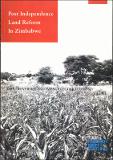| dc.contributor.author | Madhuku, Lovemore | |
| dc.coverage.spatial | Zimbabwe. | en |
| dc.date.accessioned | 2016-03-21T12:13:45Z | |
| dc.date.available | 2016-03-21T12:13:45Z | |
| dc.date.issued | 2004 | |
| dc.identifier.citation | Madhuku, L. (2004) Law, politics and the land reform process in Zimbabwe. In: Masiiwa, M. (ed.) Post-independence land reform in Zimbabwe: controversies and impact on the economy. Harare: Friedrich Ebert Stiftung and Institute of Development Studies, University of Zimbabwe, pp. 124-147. | en |
| dc.identifier.isbn | 0797427864 | |
| dc.identifier.uri | https://opendocs.ids.ac.uk/opendocs/handle/20.500.12413/10180 | |
| dc.description | A treatise on the politics behind land reforms in Zimbabwe vis-a-vis the constitutional laws obtaining. | en |
| dc.description.abstract | The “land question” in Zimbabwe, particularly, the dimensions it took with the land occupations which began on 16 February 2000, demonstrates beyond any shadow of doubt, the intractable link between law and politics. Does law follow politics? Or is it the reverse? On one view, law plays second fiddle to the deep-seated political convictions of society. In other words, law merely reflects, or is a mere record of, the political wishes of its authors. It cannot stand in the way of political choices because, according to this view, ruling politicians simply transform their choices into law.
On the other hand, there is the view that law has a force of its own, it being a set of rules in conformity with ideal values and principles, which direct societal processes including the conduct of politics. Politicians do not have an unlimited power to make law: they may only decree as law, those rules which are in line with certain fundamental principles of justice and fairness.
Both views are misleading. The first grants politicians “blank cheques” in the lawmaking process and fails to acknowledge that almost every society places restrictions on the power of politicians to make law. The second is unrealistic. It implies that, law is necessarily just and fair and that there exists an ideal set of principles and values which are acceptable to all persons and to which all law must conform. This is not the case. Law may be just or unjust and what is fair to one group of persons may be unfair to another. | en |
| dc.language.iso | en | en |
| dc.publisher | Friedrich Ebert Stiftung and Institute of Development Studies, University of Zimbabwe, Harare, | en |
| dc.rights.uri | http://creativecommons.org/licenses/by-nc-nd/3.0/ | en |
| dc.subject | Economic Development | en |
| dc.subject | Politics and Power | en |
| dc.subject | Rights | en |
| dc.title | Law, politics and the land reform process in Zimbabwe | en |
| dc.type | Book chapter | en |
| dc.rights.holder | © This collection: Medicine Masiiwa, Friedrich Ebert Stiftung and Institute of Development Studies, University of Zimbabwe | en |


